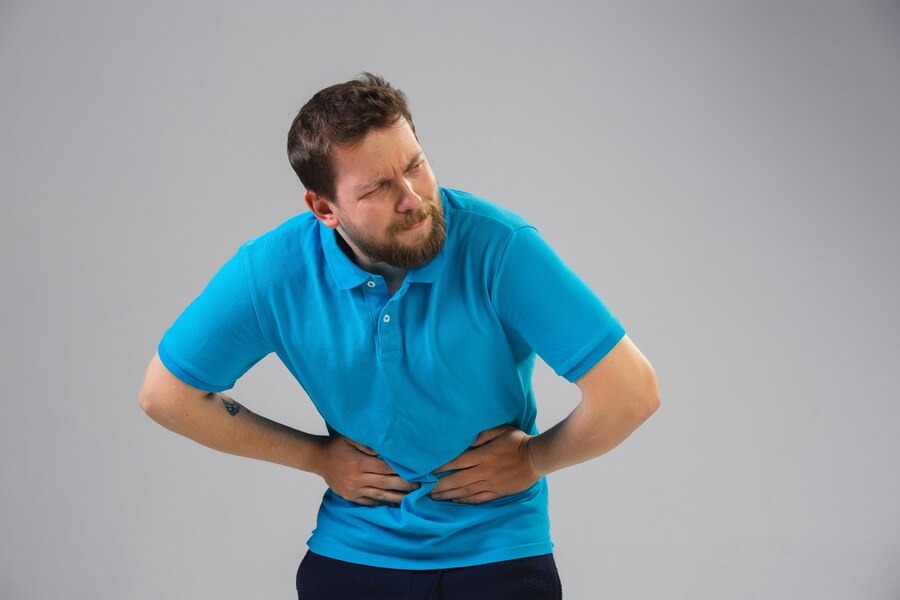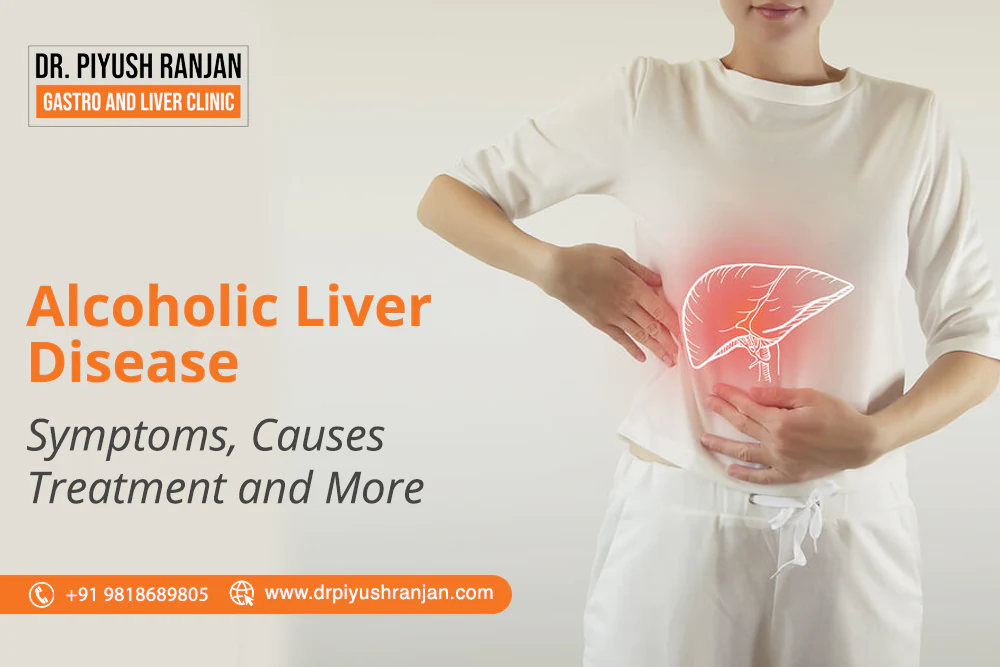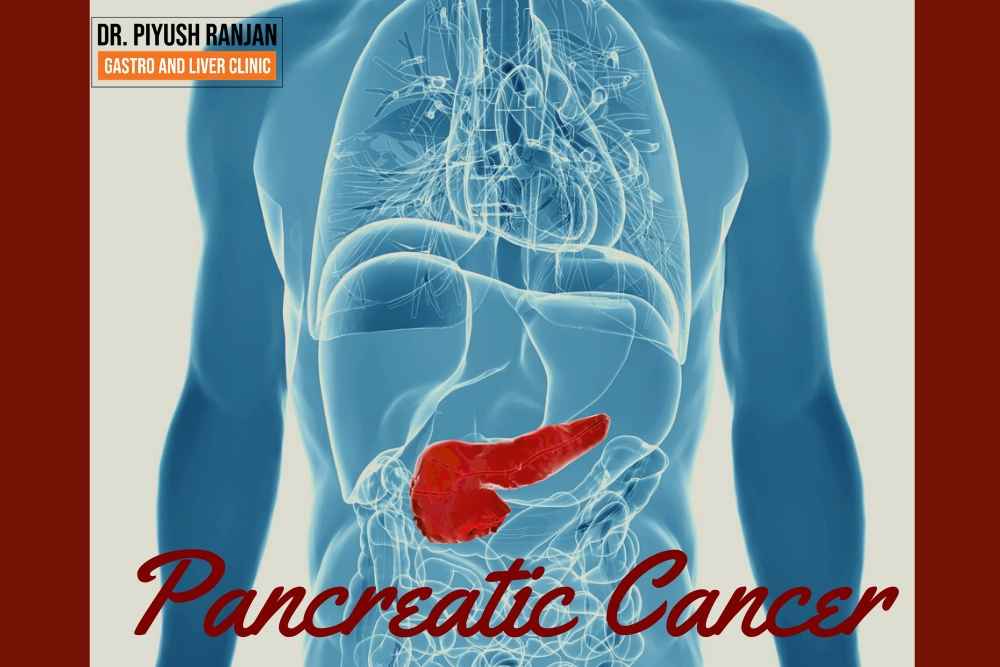Table of Content:
- What is a Gastric Problem?
- What Causes a Gastric Problem?
- What are the Symptoms of a Gastric Problem?
- Gastric problem – Natural ways to cure it permanently
- Foods To Avoid To Cure Gastric Problems Permanently
- Natural Ways To Cure Gastric Problem
- Questions To Ask Before Taking An Appointment With Your Doctor
- When to see a gastroenterologist for Gastric Problem Treatment?
- Why Choose Dr. Piyush Ranjan to treat your gastric problem permanently?
- Takeaway
What is a gastric Problem?
One of the most common gastric problems that emerge after the age of 40, is “Gas” or “Gastrointestinal Issues”. Gastric problems can be caused by a variety of factors, including indigestion or an empty stomach. A gastric issue, often known as Gastritis, is an inflammation, irritation, or erosion of the stomach lining. It begins as an acute condition and progresses to a chronic one.
Gastritis is a disorder in which the stomach membrane layer is disrupted, resulting in acid output. When these acids come into touch with the stomach walls, pain and discomfort result. This syndrome eventually leads to a problem known as Gastric Reflux.
How Does It Feel Like
Illness related to the stomach and other nearby organs involved in digestion is called gastric disease. Identifying and assessing a stomach illness can be difficult and time-consuming as several stomach and digestive problems show similar symptoms.
What Causes a Gastric Problem?
Gastric problems can be caused by a variety of factors, including excessive drinking habits, spicy food consumption, not digesting food thoroughly before swallowing, digestive issues, bacterial infections, and stress and strain.
Multiple issues associated with stomach acidity are also caused by stress, tension, and anxiety.
The following are some of the known causes of gastric problems:
- Acid reflux: It is caused by the bile Reflux is the reflux of bile into the bile duct.
- Bacterial or Virus Infection: Infection caused by bacteria or viruses. H.pylori and Helicobacter Pylori are bacteria found in the stomach’s mucous lining. H. pylori infection can lead to ulcers if left untreated.
- Dietary habits: Food habits including vegetables, grains, carbonated beverages, caffeine, fried food, and junk food habits are some of the habits which promote poor digestion and slow metabolism.
- Medical ailments: Some medical conditions like chronic intestinal disease, irregular bowel movement, and food intolerances are some of the reasons which can also lead to gastric problems.
Diagnosis Of Gastric Problem?
The gastrointestinal (GI) health care team may ask for diagnostic tests to enable a closer examination of the throat, esophagus, stomach, small intestine, large intestine, liver, biliary tract, pancreas, and gallbladder after reviewing symptoms.
Ultrasounds, MRIs, CT scans, X-rays, and upper gastrointestinal series (UGI) are common imaging tests for diseases related to the stomach. When combined with an X-ray, a barium swallow or barium enema can provide an even better image of the digestive system.
The medical team may advise an upper GI endoscopy or sigmoidoscopy if specific pictures and biopsies are required inside specific regions of the GI tract. These procedures employ thin tubes equipped with cameras to look for abnormalities such as polyps, lesions, precancerous and cancerous cells, and other conditions.
What are the Symptoms of a Gastric Problem?
Some of the most prevalent signs and symptoms of a Gastric Problem are as follows:
- Nausea or a stomach ache that doesn’t go away
- Belching
- Flatulence
- Bloating in the abdomen cavity
- Indigestion
- Constipation
- Diarrhoea
- Stool with blood discharge
- Pain in the Abdomen
- Vomiting
- stomach pain indigestion
- Ulcers
- Loss of appetite
- Stools with a black and tarry finish
Reason For Gastric Problem
Gastric problems are often related to the digestive system which can result from various factors. Here are some common reasons for gastric issues:-
- High-Fat Foods: Consuming a diet high in fatty foods can lead to indigestion and gastric discomfort.
- Spicy Foods: Spices can sometimes irritate the stomach lining, causing gastric issues.
- Irregular Eating Patterns: Skipping meals or having irregular eating habits can disrupt the digestive process.
- Overeating: Consuming large meals can overwhelm the digestive system and cause bloating.
- Gastroesophageal Reflux Disease (GERD): Chronic acid reflux can lead to gastric problems and irritation of the esophagus.
- Peptic Ulcers: Sores that develop on the lining of the stomach or small intestine can cause pain and discomfort.
- H. pylori Infection: Helicobacter pylori bacteria can infect the stomach lining, leading to gastritis and ulcers.
- Nonsteroidal Anti-Inflammatory Drugs (NSAIDs): Regular use of NSAIDs can contribute to gastric issues and may cause inflammation.
- Psychological Factors: Stress and anxiety can impact the digestive system, contributing to gastric discomfort.
- Lactose Intolerance: Inability to digest lactose in dairy products can lead to bloating and gas.
- Gluten Sensitivity: Some individuals may experience gastric problems due to gluten intolerance.
- Cigarette Smoking: Smoking can contribute to the development of peptic ulcers and irritation in the digestive tract.
- Excessive Alcohol Consumption: Heavy drinking may irritate the stomach lining and contribute to gastritis.
- Sedentary Lifestyle: Lack of exercise can slow down the digestive process, leading to gastric discomfort.
- Insufficient Fluid Intake: Not drinking enough water can result in constipation and gastric issues.
It’s important to note that individual responses to these factors can vary, and addressing gastric problems may involve lifestyle modifications, dietary changes, and, in some cases, medical intervention. If someone is experiencing persistent or severe gastric issues, consulting with a healthcare professional is advisable for proper diagnosis and guidance.
Medications For Gastric Problems
Antacids are commonly known stomach medications that can be purchased from a pharmacy, grocery store, online retailer, or other sources in tablet or liquid form without a prescription.
They work quickly by neutralizing your stomach acid, which helps reduce symptoms like heartburn and an upset stomach. This is a simple and safe procedure available. Antacids contain compounds known as bases or alkalis, which is why they work rapidly. An acid is neutralized or weakened when a base is added.
Some popular antacids include:
· Eno
· Gaviscon
· Tums
· Rennie
· Pepto-Bismol
They can be used to treat acid reflux, heartburn, and any indigestion. If you have gastritis-related stomach lining irritation or an ulcer in your mouth, antacids can also be helpful. They take effect swiftly, so you will be feeling well rather quickly.
Numerous active substances, including the following, can be found in antacids:
· Alginic acid
· Aluminium hydroxide
· Subsalicylate of bismuth
· Calcium Carbonate
· Magnesium Carbonate
· Magnesium Oxide
· Trisodium Magnesium
· The bicarbonate of sodium
If you don’t have any antacids at home and you get acid reflux or heartburn in the middle of the night, you may manufacture your own by adding a tablespoon or two of bicarbonate of soda to a glass of water.
In the short term, antacid medications that contain alginate or alginic acid can help stop the conditions causing indigestion or heartburn from happening again. They not only neutralise the acid but also provide a barrier to shield your stomach and gullet from discomfort.
To determine how and when to take the medication, make sure you follow the directions on the box or insert. It is usually recommended that you take them with meals or shortly after eating, as this is when heartburn and indigestion are most likely to occur.
Antacids might impact the effect of other medications, so don’t take more than the suggested amount or take them within two to four hours of each other. When used as directed, antacids typically don’t have many negative effects, although occasionally you might encounter:
· Constipation
· Diarrhoea
· Vomiting or feeling queasy
· Stomach aches
· Wind-related flatulence
You should feel better if you stop taking your antacid or switch to a gastric medicine with a different active component if you discover that it is causing any of these symptoms. If not, meet your physician or pharmacist. Once you stop using the medication, these symptoms should go away.
Foods To Avoid To Cure Gastric Problems Permanently
Gastric issues can be embarrassing, painful, and uncomfortable; however, they do not pose a severe health risk, but people experiencing discomfort might need gastric treatment to get rid of it. There are many foods that need to be avoided to get rid of gastric problems permanently; some of them are listed below for you :
- Dairy is the toughest to digest because it contains lactose content. When lactose is improperly digested, people may experience gastric issues. Thus, avoid dairy products and consume lactose-free dairy, like yogurt or curd.
- Avoiding fatty foods is best to cure gastric problems as fatty foods stimulate the contractions of the digestive tract. It slows down the digestive process and also causes constipation. Avoid consuming butter chase and other high-fat foods.
- Oily foods are the most common reasons that trigger gastritis and can lead to diarrhea. People must avoid them to get rid of gastric issues, which can cause bloating and heartburn.
- Spicy foods trigger gastritis as they stimulate the digestive system. If you have severe digestive issues, avoid spicy foods.
- People having gastric issues must also avoid foods that are high in insoluble fibers, like oats, fruits, peas, and beans, as they are harder to digest.
- Avoid having foods that have high starch content due to the presence of complex carbs. Avoid foods like corn, pasta, potatoes, etc.
- Alcohol consultation worsens gastric problems as it thins your stomach linen.
Foods To Eat To Reduce Gastric Problem
- Water: is necessary for healthy digestion, so make sure you get plenty of it every day. This is one of the simplest at-home treatments for stomach issues.
- Avoid sleeping Flat: When you sleep, attempt to use a pillow or an angled backrest to reduce the amount of acid in your stomach, which might worsen your gastrointestinal symptoms.
- BRAT: Try the BRAT diet, which comprises items like bananas, rice, applesauce and toast, and mild tea that are gentle to the stomach.
- Spices: like cinnamon, cloves, and cumin are believed to lower inflammation, soothe the lining of the stomach, promote quicker digestion, and enhance bile production.
- Figs: While they could lessen the acidity of your stomach secretions, consuming too many of them could exacerbate gastrointestinal issues.
- Aloe Vera Juice: Studies have indicated that it can lessen the symptoms of acid reflux and offer some relief.
- Basil: This herb may have anti-ulcer qualities and can lessen gas production, both of which may help with stomach discomfort.
- Liquorice: It is believed to alleviate gastrointestinal issues by promoting improved and healthier stomach lining protection.
- Coconut water: Packed with full of magnesium and potassium, this beverage may help ease the pain associated with stomach problems.
- Yarrow: Due to its reputation as an acid reducer, the stomach may create less acid as a result of using it.
- Ajwain Seeds: Because ajwain seeds contain thymol, it is believed to help speed up digestion, which may lower the danger of gas accumulation.
- Triphala Powder: This herbal powder is said to help with stomach problems when soaked in water and taken at night.
Yoga Exercises To Reduce Gastric Problem
There are a number of yoga poses that can be helpful in Gastric Pain Relief, but here are some best Yoga Poses For Gastric Problems.
Pawanmuktasana
Also called the gas release position or the wind release pose, is pawanmuktasana. As the name implies, Pawanmuktasana comes from the terms “Pawan,” which means wind or gas, and “Mukta,” which means release or comfort. By expelling the gas from our stomach, this asana helps. Indigestion after eating frequently results in gas. Furthermore, indigestion is the root cause of many issues beyond only upset stomachs, such as migraines, joint pain, etc.
Balasana
Shashankasana and Garbhasana are other names for this pose in yoga. Child’s pose is known as balasana, from the Sanskrit words “Bala” (child) and “asana” (posture). Balasana is a common final pose in yoga, emphasising correct breathing methods. Breathing should be slow, steady, thin, and lengthy. The fundamental idea is that you must inhale during stretching and exhale when flexing.
Paschimottanasana
The seated forward bend position, or paschimottanasana, is one of the fundamental sitting asanas. It’s also a fundamental yoga stance. As the name suggests, the primary goal of this asana is to flex the hip joint.
Supta Matsyendrasana
The Sanskrit term “Supta” means to lie down, “Matsya” means fish, and “Endra” is the name of Lord Indra. This is where the phrase Supta Matsyendrasana originates. Therefore, the term “Matsyendrasana” refers to the stance known as “Lord of the Fishes.” This is an altered version of the seated asana known as Ardha Matsyendrasana. Supta Matsyendrasa mostly involves twisting movements to target your abdomen and spine. As a result, the phrase “twisted spine pose” is also frequently used to describe it.
Ananda Balasana
A variation of Balasana is called Ananda Balasana. Also called, as the name implies, the joyful baby stance, in which “Ananda” denotes contentment and “Bala” denotes a baby. Because the stance resembles a contented infant or a dead insect, some people sometimes call it the “dead bug pose.” But a positive outlook has made the cosiness of the newborn posture more acceptable. Ananda Balasana is a common warm-up pose to get one ready for more strenuous poses.
Natural Ways To Cure Gastric Problem
The best gastroenterologist also suggests many natural ways to cure gastric problems:
- Make a habit of eating slowly, and don’t talk while eating, as it allows more air to enter your body, leading to bloating.
- Alter your diet, as it can help you cure gastric problems. Avoid eating the listed foods and consume coconut water, fresh juices, and buttermilk instead of carbonated drinks.
- Stay physically active, as it is vital for perfect gut health. Try out simple exercises like yoga and brisk walking, which can help you to get rid of the gastric problem naturally.
- Taking about 8 hours of sleep is also important for a good digestive system. Sleep disturbances can lead to severe digestive issues like acid regurgitation, abdominal pain, distention, and burping.
Questions To Ask Before Taking An Appointment With Your Doctor
If all the above-listed natural ways do not help and symptoms start hampering your lifestyle, and if you notice any symptoms like severe abdominal pain, consistent constipation, etc…. Then, it is time to visit the doctor for gastric treatment. Dr. Piyush Ranjan is a well-known, experienced, and the best gastroenterologist in Delhi. He specializes in treating all kinds of gastrointestinal and liver diseases. Be well prepared to ask your queries before making an appointment :
- What is the root cause of my symptoms?
- What are the treatment options for my problems?
- Are there any complications or risks related to my problem?
- How to prevent future digestive issues?
- What are the gastric foods to avoid to prevent gastric issues?
Also Read This Blog: What is gastrointestinal disorder? How do you know when there’s a problem?
Managing your digestive health is very important, so consulting an expert gastroenterologist is necessary. Whether you are seeking gastric treatment or just looking to maintain your gut health, book your appointment with one of the best gastroenterologists in Delhi, Dr. Piyush Ranjan, as he will provide you with valuable insights and assist you in making an informed decision about your health.
When to See a Gastroenterologist for Gastric Problem Treatment?
Gastritis is a condition that can be either acute or chronic based on symptoms and causes. Acute gastritis is a condition in which the cause of the disease is lifestyle habits. Acute gastritis is a sudden and short-term condition that normally resolves on its own.
Chronic gastrointestinal disease, on the other hand, does not go away on its own. Lifestyle changes can assist to reduce acidity, but they will eventually return. The acute gastritis symptoms will persist for six months or a year in this instance, leading to more complex circumstances such as unbalanced digression, lack of appetite, nausea, vomiting, and so on.
It could also be a symptom of a more serious condition, such as stomach cancer. To cure this ailment, one should seek medical help.
In most circumstances, indigestion and an upset stomach are not a cause for concern. For the most part, symptoms should go away within a few hours. Vomiting and diarrhoea that lasts more than a day should be addressed properly since senior people and children can get dehydrated much more quickly.
If you experience severe, frequent, or persistent stomach problems, you should see a doctor. If you have any gastritis symptoms that are continuous or persistent without any relief it’s also a good idea to see a doctor.
You should see a doctor immediately if the symptoms of a gastrointestinal condition are severe and interfere with your everyday activities, or if it is accompanied by other symptoms such as:
- Stools that are bloody
- Diarrhoea
- Constipation that persists
- Loss of weight
- Bowel habits have shifted.
- Chest pain
- Vomiting
- Heartburn
Also Read: |10 Reasons you might need to see a Gastroenterologist|
Why Choose Dr. Piyush Ranjan to treat your gastric problem permanently?
If Gastric problems need medical advice Dr. Piyush Ranjan is one of the most renowned doctors in Delhi-NCR for gastric problems. Dr. Piyush Ranjan is a well-known gastroenterologist, practising at Sri Ganga Ram Hospital in New Delhi.
He received his medical education at Maulana Azad Medical College in New Delhi and finished his gastroenterology training at SGPGI in Lucknow in 2003.
He is a hepatologist who is particularly interested in therapeutic endoscopy and ERCP. He is an expert in procedures such as colonoscopy, endoscopy, ERCP, sigmoidoscopy, endo ultrasound, and capsule endoscopy, and he specialises in the treatment of gastrointestinal issues and liver diseases. He has a remarkable medical career that includes training at India’s top medical institutes.
With excellence in quality, caring, and innovation, premier healthcare service providers in the field of gastroenterology Dr. Piyush Ranjan at his clinic offer a team of the greatest gastro doctors and skilled healthcare practitioners in Delhi, ensuring that every patient receives the best diagnosis and treatment available. Every patient who comes to our clinic is initially diagnosed through the use of relevant tests. The goal of diagnosis is to determine the root cause of a disease or condition and inform the patient about it.
He has vast expertise and knowledge backed by more than 20 years of experience and more than 30 thousand happy patients.
Takeaway:
Gastric problems are frequently associated with minor discomfort that can be relieved on their own or by simple home remedies. As a result, it is critical to maintain a healthy routine and lifestyle to permanently cure the gastrointestinal problem. Maintain a healthy lifestyle by exercising regularly, eating well, and staying active. Home remedies should only be used after consulting with a doctor. Although these culinary tips may not provide long-term benefits, seeing a gastrointestinal expert is the best option.
Above all, if nothing else works, see a doctor to find out what’s causing your gastrointestinal issues. Get competent guidance or a diagnosis instead of hunting for more home cures and medications. It could be a symptom of serious health problems.
FAQ’s
Can gastric be cured permanently?
The issue of gastrointestinal disorders cannot be permanently resolved by any kind of treatment. The best method to prevent stomach problems is to stay away from meals that are oily, fried, spicy, and high in sugar. Eat in modest portions and thoroughly chew your food before swallowing.
What is the fastest way to cure gastric issues?
Drinking lemon water or tea is an excellent way to provide immediate relief from stomach issues. To improve the flavour and health benefits of lemon water, one can also add ajwain, powdered roasted cumin seeds, and a sprinkle of black salt. This makes lemon water a great beverage to soothe the stomach.
Which food is good to avoid gastric illness?
Try the BRAT diet, which comprises items like oatmeal, crackers, bananas, boiled potatoes, broth, and mild tea that are gentle on the stomach. Spices like cinnamon, cloves, and cumin are believed to lower inflammation, soothe the lining of the stomach, promote quicker digestion, and enhance bile production.
How do I stop gastric illness?
Here are some easy solutions for stomach issues that you may try at home: Warm water, lemon juice, baking soda, and lemons should be consumed in moderate quantities. It also helps to sip on a glass of chilled milk, buttermilk, or mint juice. You may also attempt to sip tea.




